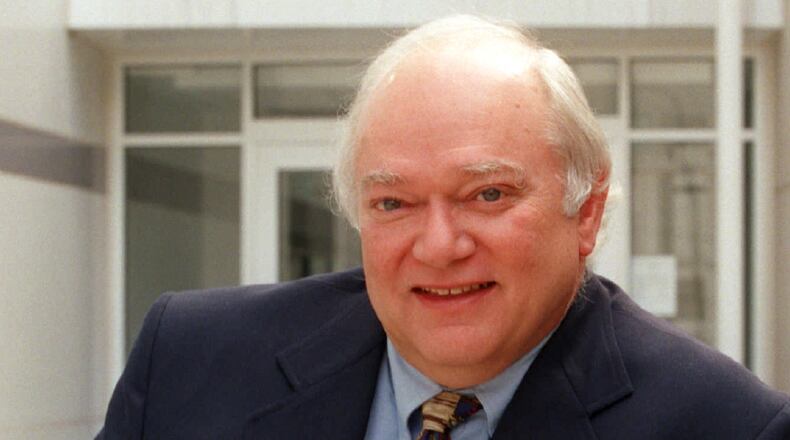As a 10-year-old boy living in the Jim Crow South, James Elliott was taken aback when his friend Roosevelt, a Black sharecropper’s son, had to head behind the store to buy an ice cream cone that he, as a white boy, could get by walking through the front door.
That incident, which Elliott described for an oral history project at Mercer University Law School in 2014, shaped the direction of his life. Several years after that, Elliott, as a youth minister, would challenge his own church’s hypocrisy for its reluctance to accept Black members. Decades later, he would champion the causes of under-represented minorities and the indigent as an attorney.
The former State Bar of Georgia president will be remembered at an 11:30 a.m. memorial service March 30 at Emory University’s Tull Auditorium. Elliot, a former student, spent the end of his career teaching at Emory. The former Alston & Bird partner died after a short illness January 14. He was 82.
Elliott is credited with co-founding in 1968 the Georgia Legal Services Program, a non-profit law office that provides low-income Georgians outside the Atlanta area with free civil legal representation. In 1989, despite vocal opposition from some in the legal community, Elliott encouraged the Georgia Supreme Court to implement a mandatory program that collects interest from attorney’s client funds to pay for legal charities, primarily services for the indigent. It has raised more than $100 million.
As the state bar president, Elliott also spearheaded a program adopted by the state’s high court to raise the standards of professionalism for practicing attorneys, with an emphasis on civility, fairness and integrity.
Colleagues remembered Elliott as a hard-working lawyer whose impact on the profession was greater than witnessed in his handful of courtroom appearances. He was outspoken, though exceedingly humble. Elliott believed that people are capable of more and greater accomplishments if they worry less about getting credit for them.
“He didn’t hurt his arm trying to pat himself on the back,” said John Sammon, also a past Georgia State Bar president and a lawyer whom Elliott mentored.
Sammon described Elliott’s efforts on behalf of the indigent and in promoting greater professionalism among lawyers as “unconventional” decades ago when he pursued those causes. Sammon also said the self-deprecating Elliott often chalked up his accomplishments to “being at the right place at the right time.”
“No, it wasn’t serendipity or luck. Jim was prepared to be there,” Sammon said. “And when an opportunity to take the shot came back, he took that shot.”
Elliott, a Hiram native, grew up in DeKalb County where he graduated from Murphy High School. He attended Emory University and its School of Law. After a stint in the Air Force Reserve, Elliott was hired by Alston, Miller & Gaines (now Alston & Bird). There, Elliott successfully defended the constitutionality of the fair housing provisions of the 1968 Civil Rights Act.
Elliott became a partner at Alston in less than four years, and headed the firm’s real estate division. He chaired its professional hiring committee, where he persuaded the firm to hire its first African American associate in 1970, making Alston the first major big city law firm south of Philadelphia to do so.
Heart problems forced Elliott to give up working at Alston & Bird in 1996. He returned to his alma mater as an associate dean of the law school, a position Elliott held until his retirement last year. He was much loved by students, said fellow faculty member Richard Freer.
Freer said Elliott brought “reality” to the classroom because of his experience as a practicing attorney, something most other law school professors don’t offer because of their relatively short stints practicing law before turning to academia.
“Jim was a real world anchor … the rarity,” Freer said. “Somebody who had made it, a big time lawyer, partner and president of the state bar. He brought to the classroom a practical sense that theoretical faculty members just can’t, because we didn’t do it in the same way.”
Freer visited Elliott the day before he died in Hiram, where Elliott had moved last year. Freer described the dying man as “buoyant,” in “wonderful spirits,” as he talked about what it had meant to be a lawyer.
“It’s a demanding profession, a noble profession, a rewarding profession having nothing to do with money. It’s rewarding because you’re serving other people’s needs,” Freer recalled Elliott saying.
Then Elliott grinned and said “but you’re not entitled to your own set of facts,” Freer recalled. “Facts are facts.”
Elliott is survived by his 20-year partner, Phyllis Hale Marshburn; two sons, Chris and Charles Elliott; stepchildren, Molly Marshburn Bell and Jeffrey Marshburn; six grandchildren and one great-grandson. The family requests that, in lieu of flowers, contributions be sent to the A. James Elliott Community Service Award at the Emory School of Law.
About the Author

